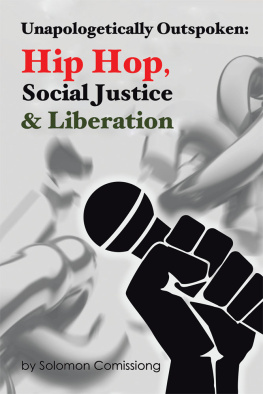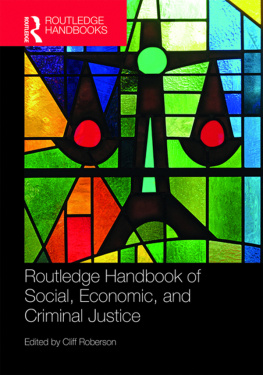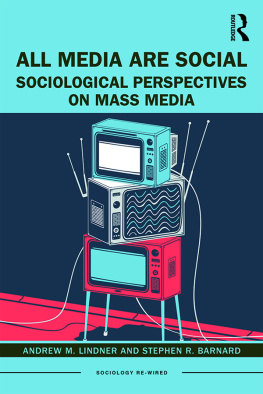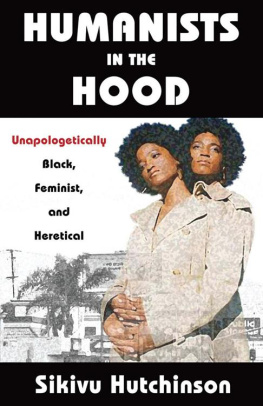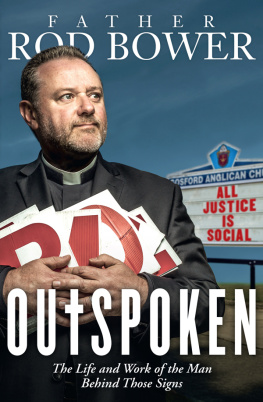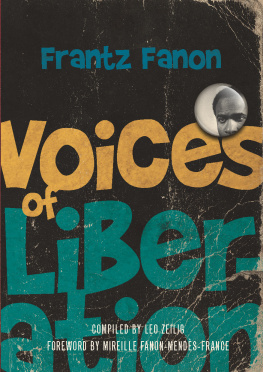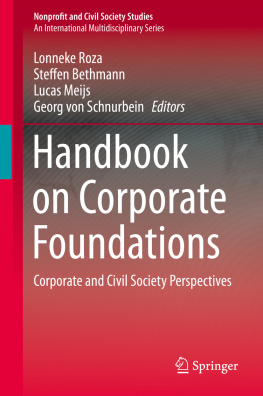UNAPOLOGETICALLY OUTSPOKEN
Hip-Hop, Social Justice and Liberation
Solomon W.F. Comissiong
www.solomoncomissiong.com
Copyright 2017 by Solomon W.F. Comissiong.
Cover Design by Tim Baldauf-Lenschen
Library of Congress Control Number: 2017905437
ISBN: Hardcover 978-1-5434-1404-2
Softcover 978-1-5434-1403-5
eBook 978-1-5434-1402-8
All rights reserved. No part of this book may be reproduced or transmitted
in any form or by any means, electronic or mechanical, including photocopying, recording, or by any information storage and retrieval system,
without permission in writing from the copyright owner.
Any people depicted in stock imagery provided by Thinkstock are models,
and such images are being used for illustrative purposes only.
Certain stock imagery Thinkstock.
Rev. date: 04/05/2017
Xlibris
1-888-795-4274
www.Xlibris.com
758952
CONTENTS
This book is dedicated to those who have had the courage to speak out in the face of injustice; those who do this play a significant role in setting a most courageous example for others to follow. The more we collectively speak out against critical issues such as imperialism, institutional racism, structural oppression, misogyny, and the prison industry complex (to name several), the more it plays an important role in developing a critical consciousness. This awareness is the impetus toward mobilization and then sustainable mass organization. And with mass organization, social justice can be achieved. We can play a significant role in making this a much better worldfor generations to come!
He who passively accepts evil is as much involved in it as he who helps to perpetrate it. He who accepts evil without protesting against it is really cooperating wit h It.
Martin Luther Kin g Jr.
Unapologetically Outspoken: Hip-hop, Social Justice and Liberation confronts social issues that are often ignored by the US corporate media, US educational institutions, as well as by the US government itself. It is a collection of essays that challenge mainstream perspectives on everything from institutional racism to imperialism to the vastly flawed United States electoral sy stem.
This book provides perspectives omitted by virtually every mainstream corporate media outlet throughout the USA. If the US corporate media system were balanced or democratic, it would provide the vast array of progressive and radical perspectives that readers will find within Unapologetically Outspoken: Hip-hop, Social Justice and Libera tion .
The US corporate media is the complete opposite of democratic or balanced. It is a system that primarily represents the perspectives of the vulture-like corporations that finance them. It is a system that, ultimately, represents the interests of the ruling class, and not those of the great mass of US society and certainly not that of the bulk of people of color within the structurally oppressive stolen borders of the US. The US mainstream media are, in essence, corporations themselves, whether it may be News Corporation, which owns Fox News, Comcast that owns MSNBC, or even Disney that owns ABC. Their goal is to continuously broaden their ever-growing economic bottom lines, not to provide well-balanced critical analysis of domestic and global issues. Keeping the vast majority of Americans oblivious or completely in the dark on critical issues plays into their greedy h ands.
If Americans were to suddenly begin to actually think about how they spend their money, how they viewed electoral politics, or even about what they put into their bodies; it would have an enormous impact on the flow of revenue that typically finds its way into the coffers of mega transnational corporations. These key areas, and more, are the last places corporations and their accomplice politicians wish to have Americans critically analyze. Having a populous that is significantly dumbed down plays to the advantage of those that wish to keep political and economic power as concentrated as possible. There is no true democracy under these types of conditions, especially when there has been concerted effort to limit the flow of information to the masses. This selective trickling down of information begins in Americas public education systems, especially in social studies and history courses. Critical thought and media literacy are very much feared by the so-called ruling class, thus they are not emphasized in most US sanctioned schools. Corporations under the guise of the charter school scam are gobbling up schools at a rapid rate. The charter school scheme is a nefarious scam that has been supported by Democrats and Republicans a like.
American students are not supposed to think about the repercussions and consequences of the actions of the governments domestic and foreign policy; they are supposed to buy into the bullshit notion of American exceptionalism, and, in some cases, a new-age manifest destiny. Their fledgling minds are not supposed to think about the fact that the US represents 5 percent of the worlds population yet consumes greater than 25 percent of its resources, or even that it contributes to over 25 percent of the earths waste. These destructive trends, along with the USAs monstrous imperialist military, are creating havoc throughout the world. The cancerous thread of American capitalism can routinely be found stitched through its societal fabrica textile in desperate need of altering into something much more human friendly. If these trends do not change, the USA will increasingly be isolated from the rest of the world, thus limiting future generations from becoming good global citi zens.
The world desperately depends on the hopes that future generations of Americans will be less imperialist minded and more social justice centered. After all, plundering other peoples land and waging illegal wars will never gain you friends. While US politicians arrogantly lecture the rest of the world on human rights, some of the most egregious human rights violations occur on US soil or by way of US military aggres sion.
Dating back to its duplicitous inception, the United States has been engaged in a state of perpetual war. This trend needs to be reversed in order for a culture of peace to be cultiv ated.
Within the United States own borders, the US government incarcerates more people than any other country in the world, with most of the prisoners being black or brown. As a matter of fact, one in eight of the worlds prisoners is an African American incarcerated within the USA. Some activists and scholars have justifiably likened it to a New Jim Crow or modern-day slavery. However, either way you look at it, the destructive traits of institutional racism can be found clos e by.
The United States has become a nation that not only condones institutional racism and white supremacy; it cultivates it. Institutional racism and white supremacy are implicitly celebrated every day throughout the United States. From the federal holidays that commemorate murderers and rapists like Christopher Columbus to currency that displays the images of slave owners, American society is riddled with white supremacist celebrations. And on the polar opposite of the spectrum, US society routinely makes excuses for imagery that is blatantly offensive to Native Americans. One needs to look no further than the names and images found associated with football teams like the Washington Redskins, to see the repugnant examples. A society that accepts this kind of behavior is culturally sick. Rehabilitating this social malady can only happen when broad-based public conversations are facilitated everywhere from schools to the mainstream media. Unfortunately, as of 2017, these ideas are not nationally supported. They are, in large part, not supported because many voices of progressive change are systematically suppressed. They are suppressed by many who are stuck in a quagmire of racist ideology, white privilege, and xenophobia that prevents them from viewing the world in a more humane and panoramic perspective. Many of Donald Trumps supporters harbored racist and xenophobic ideologies long before he became a candidate. He merely made it popular for them to make their views pu blic.
Next page
